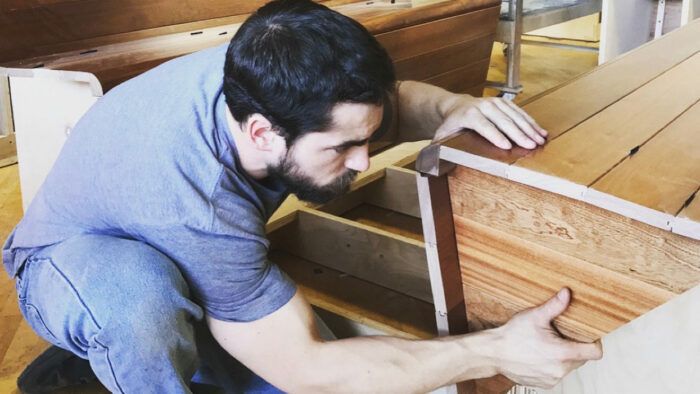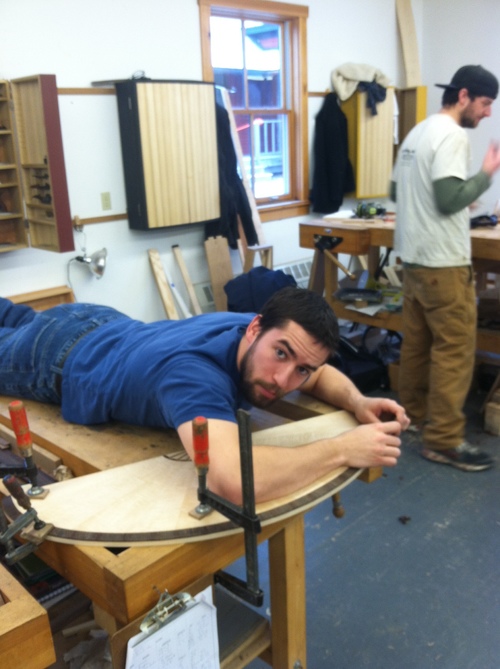The benefits of being a hobbyist
Before you decide to go pro, Erik Curtis asks you to consider what you want to get out of your woodworking experience.
We’ve all had that moment. Perhaps it was in your garage workshop. Maybe you were watching your grandparent make something so delicate and skillful you were fascinated by the process. Or you may have been like me, sitting in your college dorm room with DVDs of woodworking projects (yes, I remember the days before YouTube) taking in the woodworking gospel as ravenously as a congregant at a tent revival. And the thought hits us. We stop, stare off into the distance for a brief moment, and mutter to ourselves “This … this is what I’m going to do for the rest of my life. I’m going to be a professional woodworker.” It’s a profound moment. But looking back at it 15 or so years on, I would ask myself a different question: Do you want simply to make beautiful objects or do you want to be a small business owner?
Now I’ll give the spoiler right here–if I were to do it all again, I would do it all the same. I love what I do. And that’s saying something. When you do anything for 12 hours a day nearly every day for years on end it’s bound to lose some of its luster. Work is work, after all, and hard work is hard. But being a “professional” woodworker doesn’t necessarily make me a better one than others. I know plenty of seasoned woodworkers who could hand-cut-joinery me right out of the conversation, and still more who explore weird niches of the woodworking world. As a strong advocate for people finding their artistic voices, I know that those “hobbyists” have a real advantage I don’t: time to play.
I have a friend named Paul. You may know him as @copper_pig_fine_woodworking on Instagram. A scientist by day (a biology PhD, in fact) and a fantastic woodworker by night. He gets weird. Paul explores areas that intrigue him in a given moment, be it inlay, marquetry, joinery, texturing, engraving, etc. and he pushes himself and his craft relentlessly. While some may see him as “just” a hobbyist, he is a better woodworker than a good number of professionals I’ve met over the years because he has the time and freedom to improve his craft and his design eye while not worrying about what products will sell in order to pay his bills. He has the freedom to play.
I’m not saying don’t be a professional. I love doing this full-time. I’m ruined now and could never go back to having a more traditional job. What I’m saying is this: It’s not for everybody. Paul would be miserable as a full-time woodworker (we’ve talked about this many times, including on our podcast). He’d be bored by the repetitiveness of the work and frustrated with the hustle. There is also a part of his mind that needs to be occupied by science (while my brain only partially functions so it’s fully occupied by woodworking). So if I were to talk to a young Paul, I would advise him not to go full-time with his passion. Not because he’s not good enough, but because the world needs passionate people who are free to push the boundaries, to think outside of the box. The world needs hobbyists just as much as full-time professionals.
So if you’re a hobbyist, I don’t think you’re any less of a woodworker. We are all on equal footing. We all love this thing called woodworking and, in an age of computerized processes and maximizing efficiencies, we find a great deal of joy in the insufferably inefficient process of making furniture by hand.
Now go make a thing. And try to enjoy the process.
—Erik Curtis




















Comments
Great BLOG. I wish I had fully functional brain, I might be doing what you did. However, I can see brain functionality is subjective. I guess I just chose to dream about woodworking, making projects like what Paul is doing or having a successful business like you.
Well said, Eric.
I have considered giving up doctoring and becoming a full-time woodworker. I enjoy being a small business owner and know how to budget.
But, but...(sic), I also considered everything Eric has said here and decided that what I love about woodworking would be destroyed by having to do it to someone else's schedule - Even being rushed to finish a project for the 'boss' takes most of the fun out of it.
Kudos to those who do take the step, but I know I will be a better woodworker remaining as an amateur.
Thanks Eric for sage words and also for your really enjoyable content on YT.
I’ve often told my wife, “If I could just sell that (jewelry box, shelf, small cabinet, etc.) for $2000, I could make a living at woodworking. ;)
I do think the repetition and efficiency necessary to go pro would take some of the fun out of working wood. Retired now, I have the luxury to take my time and spend as many (or few) hours in the shop as I want. Maybe selling some simpler pieces at fairs or farmers markets would be fun … for now, my pay is when my better half smiles and says “wow!”.
…and a sense of satisfaction of learning and making something new and having it work out.
Very well said. I’m relatively new to woodworking and I’ve been watching and learning from others via YT, including @ENCurtis. I can’t imagine ever being a professional woodworker, as I got into the craft as an escape from the stress of my day-job. To make it about making money would really steal all the benefit the focus, the planning and the challenge of learning new skills is providing me. For those who are professionals, … please keep making your videos, hosting your classes and seminars (I’d love to see more online options for each), as they are teaching me new things every time I tune in. The joy of learning these new skills and “making a thing” I can use and love, and maybe even gift, is hard to describe and often beyond words.
I tried over 30 years ago. I placed my work in a gallery in Atlanta. The gallery owner said people loved the work but balked at the price - I would have made minimum wage.
Started a technology business and made enough money to finally get my machines out of storage. If you have a bent toward hand work, you can’t be successful. I think now social media is the key to success in woodworking.
This is well said and the world is a hard place when the hobby you love is now what puts food on the table. I've spoken to a woodworker in town that I admire and respect and when I told him of my thinking about leaving my day job for a life in cabinet making his words were, "You're an engineer aren't you?" To which I confirmed, and he asked, "Your job has benefits and good pay right?" And I confirmed that too. He said then keep it as a hobby. Take a few commissions every year but keep it as a hobby, it's a hard life. Now through the last several years I've been promoted to the Ops manager of that same engineering group I worked for and no longer have a creative outlet with the engineering job and have to rely on woodworking as that creative outlet. After finding out there is a hereditary heart condition in my family, my wife and I have made plans to retire early with no debt and have my sunset career. I may even decide to teach a few classes to give back something to younger woodworkers. Bottom line is: everyone needs to understand how making your hobby your way to put food on the table changes the dynamics of your work. You may think what you make will sell, ultimately, you're going to need to make what someone is willing to commission you to build.
Amen
Log in or create an account to post a comment.
Sign up Log in